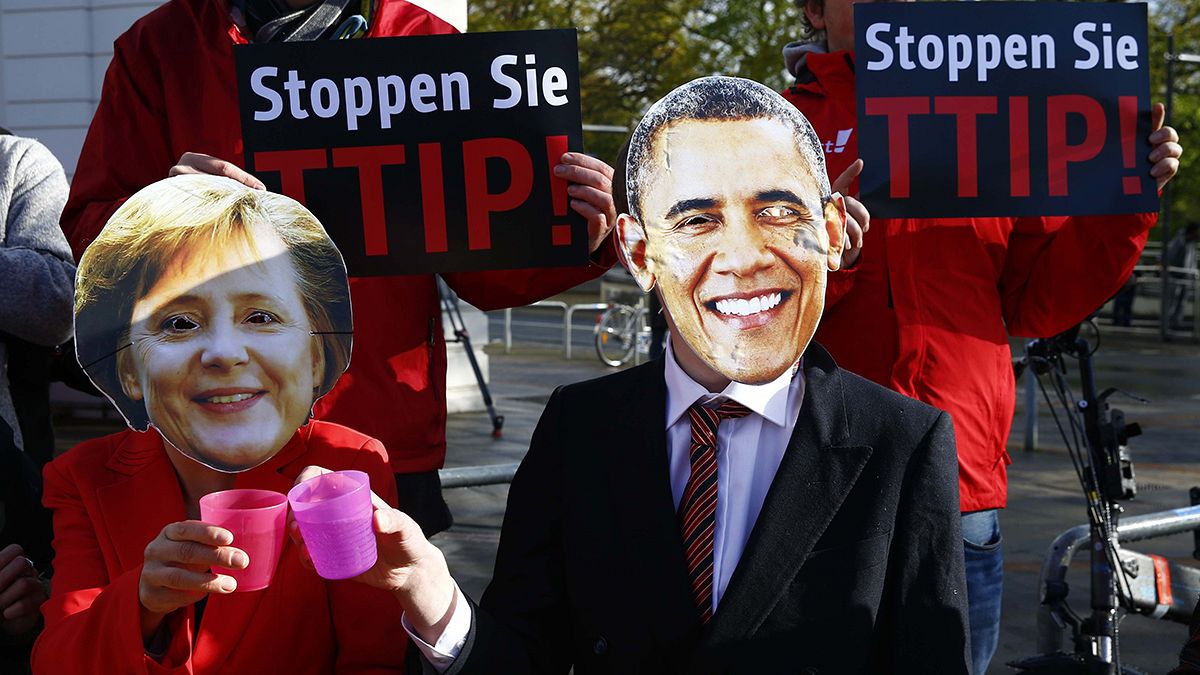Thousands took to the streets in Hanover over the weekend to demonstrate against the proposed Transatlantic Trade and Investment Partnership deal or TTIP.
Thousands took to the streets in Hanover over the weekend to demonstrate against the proposed Transatlantic Trade and Investment Partnership deal or TTIP.
Greenpeace at Anti-TTIP Demo in Hannover #StopTTIPpic.twitter.com/1KCngvjH3H
— Greenpeace Paderborn (
greenpeace_pb) <a href="https://twitter.com/greenpeace_pb/status/723840147104665600">April 23, 2016</a></blockquote> <script async src="//platform.twitter.com/widgets. Negotiations were launched three years ago and the <blockquote class="twitter-tweet"tw-align-center data-lang="en"><p lang="de" dir="ltr">Obama und Merkel kommen: AntiTTIPDemonstration in Hannover <a href="https://t.co/lJXz83iy23">https://t.co/lJXz83iy23</a> <a href="https://t.co/Llz1HNfd4q">pic.twitter.com/Llz1HNfd4q</a></p>— Die-Stadtredaktion (stadtredaktion) April 14, 2016
The aim of the negotiations is to facilitate transatlantic trade by liberalising all parts of the economy, including manufacturing goods, investments, the service industry and agricultural goods.
Those protesting against the plan claim it is an attack against democracy and workers rights, adding TTIP is being created by and for big business not by the representatives of the people, namely politicians.
#TTIP#TPP explained. pic.twitter.com/P7V1qysZb6
— Joe (@SeosamhMagAodha) April 15, 2016
Those who back the new deal say they want to abolish the red tape that exists once goods have crossed borders such as differences in technical regulations, standards and approval procedures.
“The U.S. is committed to completing a comprehensive #TTIP this year.” –
POTUS</a> <a href="https://twitter.com/hannover_messe">hannover_messeUSTradeRep</a> <a href="https://twitter.com/hashtag/HM16USA?src=hash">#HM16USA</a> <a href="https://t.co/zonETdhMPu">pic.twitter.com/zonETdhMPu</a></p>— Ambassador Costos (JamesCostos) April 24, 2016
This takes time and costs money for companies that sell both in Europe and the US.
In motor industry once a car is approved safe in Europe, it has to undergo another approval procedure in the US despite safety standards being similar.
A major concern for anti-TTIP groups is that the talks are being held in secret with elected representatives knowing little of the content and the general public kept well and truly in the dark until negotiations are finished.
Parliamentarians can then only accept or reject the agreements, without being able to request alterations.
Furthermore Europeans fear that workers rights in the US fall well below those in Europe.
Campaigners in the UK requested from the Department for Business Innovation and Skills what risk assessments had been made about the treaty.
It replied that one had been carried out by the London School of Economics, which stated “would have limited political and economic benefits” and may result on “meaningful economic costs in the UK”.
#TTIP talks can be completed in 2016, says Obama at #HannoverMesse | Read more: https://t.co/kYNqK0nrrypic.twitter.com/fF6cNSNLlG
— Joanna Sopinska (@JoannaSopinska) April 24, 2016
US President Barack Obama backs the deal saying it would create millions of jobs and increase trade.
